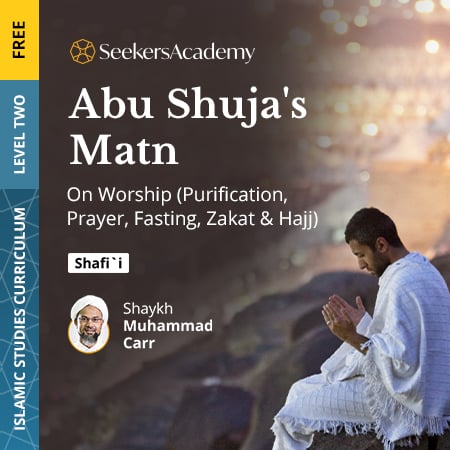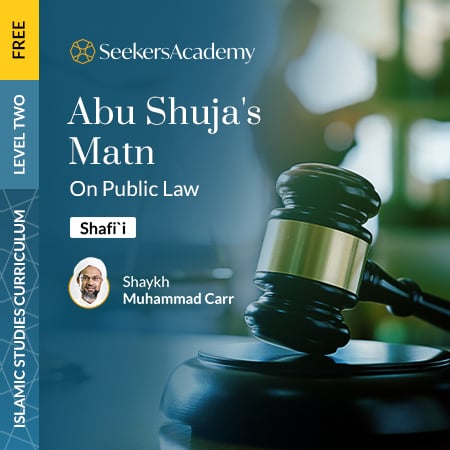
Every human action has a divine command associated with it, making it obligatory, recommended, permissible, offensive, or unlawful. We cannot infer these commands with our minds–the only way to learn about them is by learning them from the Prophet (Allah bless him and give him peace). The goal of the science of sacred law (fiqh) is to accurately guide us on what the Prophet (Allah bless him and give him peace) taught us about all human actions, whether related to worship, trade, investment, food, hunting, oaths, entertainment, marriage, divorce, inheritance, legal procedures, or public policy.
This four-part series of courses will introduce you to the science of sacred law as it relates to all aspects of life, focusing in this first part on the rules of purification and prayer.
- Teacher: Shaykh Muhammad Carr
This course is an explanation of Matn Abi Shuja’, written by the learned and pious Shafi‘i scholar from Basra, Ahmad ibn al Hussein al-Asfahani (d. 500’s AH / 1100’s CE), more famously known as Abu Shuja‘. His Matn Abi Shuja‘, a short introduction to the Shafi‘i school of sacred law, is one of the most blessed textbooks of the school–although it was written almost a millennium ago, it remains an integral part of Shafi‘i fiqh curricula all over the world and has been the subject of dozens of commentaries and super-commentaries ever since it was written all the way down to the present age.
- This course is for adults.
- It is particularly beneficial for students of sacred law.
- It is a Level Two course. In order to successfully complete this course, students should take On Worship (Purification, Prayer, Fasting, Zakat, and Hajj): Ba Fadl's The Short Abridgement.
- This course can also be taken by anyone who is interested in learning more about the rulings of financial transactions in the Shafi‘i school.
- Describe the historical development of the Shafi‘i school
- Learn the rules of purification, prayer, clothing, funeral rites, fasting, zakat, and Hajj.
- Memorize the definitions of key terms related to the rules of purification, prayer, clothing, funeral rites, fasting, zakat, and Hajj.
- Appreciate the depth of the Muslim scholarly tradition


